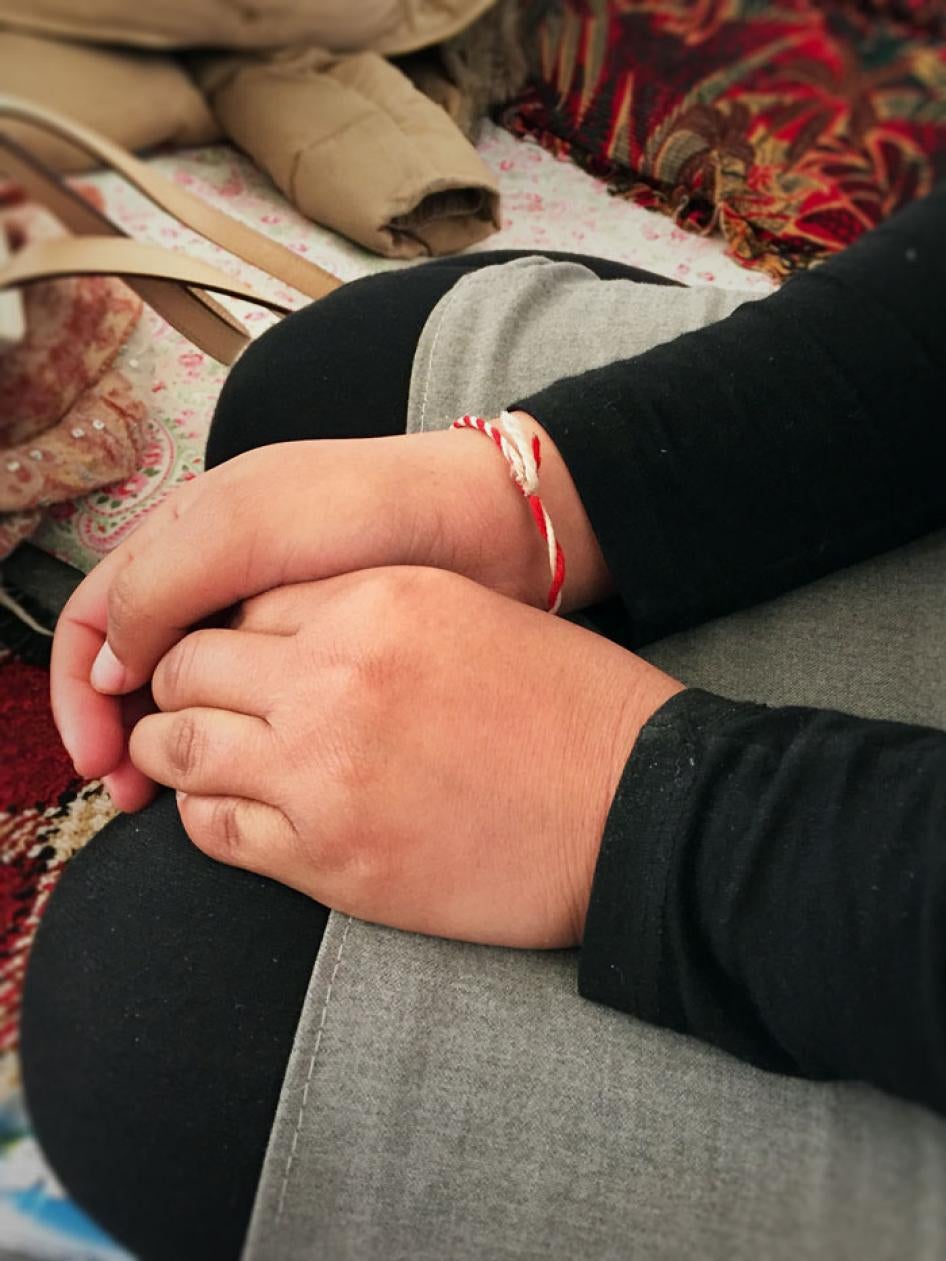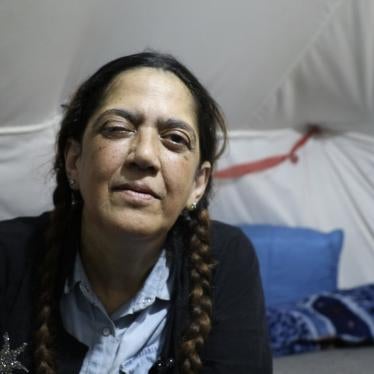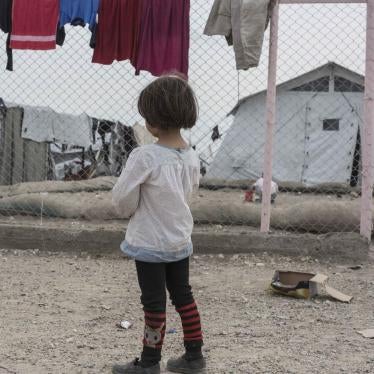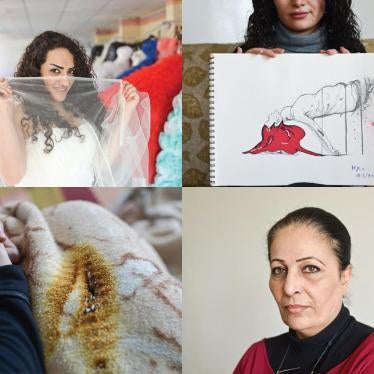“I would kill myself, if it weren’t for my kids.” Sari, 30, told me. She sat close to the gas heater, feet curled under her on the mattress on the floor, in a camp for displaced people near Dohuk in the Kurdish region of Iraq. As snow fell, she told me how the extremist armed group the Islamic State abducted her and her family from their village in Iraq.
ISIS fighters took away her 12-year-old son, and 10-year-old daughter, and then put Sari on a bus with her two younger children, and other women and children to a farm in Syria, where they ordered her to convert to Islam.
A Saudi Arabian ISIS fighter called Abu Aris al-Tusi bought her and her remaining children. She was later sold three other times. Each man raped her. One man beat her children. She escaped in January after a smuggler paid off the last man with the $20,000 her family managed to scrape together. Her family “found” her after her last owner - looking to sell her again - posted a picture of her on the Internet. He made her put on make-up for the photo.
As we talked, the two children she still has kept opening the door to her prefabricated cabin, one of hundreds in the camp in long lines, letting in gusts of cold air. Sari worries all the time about her missing children, if still alive they are likely being held as slaves, in conditions she escaped. She is now safe, but her mental pain and trauma are clear to see. But she’s not sure what could help her, or what is now available.
Human Rights Watch and others have documented how ISIS raped, forcibly married and converted Yazidi women to Islam after attacking Yezidi communities in August 2014. Almost 1,500 Yazidi women and girls ISIS took captive have escaped, but almost 2,000 remain in captivity, Hussein al-Qadi, director of the Office of Kidnapped Affairs in the Kurdish Regional Government (KRG) told me. The world has moved on. But the lives of those captured, even if they later escape, are still frozen in terrible memories. My colleagues and I hear many true horror stories in our line of work but my heart sinks whenever I see my Iraq notebooks full of harrowing details about what happened to the Yezidi women and girls. They escaped ISIS but what can help them now they’re back?
In early 2015 we found that there was very little support for traumatized escapees. Since then, some things have improved. The Kurdish regional government, UN, aid agencies, and donors have come together to provide some mental health care and psychological support for Yazidis and others, especially in the fifteen or more camps scattered around Dohuk town hosting tens of thousands of Yazidi.
But the needs far outstrip resources, the quality of care differs from camp to camp, and lack of money, confusion and stigma prevent some women and girls from accessing care. Some women can’t leave their children to reach out-of-camp services. Of the fifteen women and girls I interviewed in January, only one is receiving regular mental health support services. All reported symptoms like insomnia, nightmares, flashbacks, feelings of isolation, depression and anxiety. “I would definitely go to a psychologist if one was available,” said “Noreen,” 19, who still has unexplained pain in her legs and is unable to eat or sleep properly.
“They talk about us, we who were taken,” Noreen said about other people in her camp.
Service providers say that families sometimes stop the escapees from attending group mental health care. And just attending a one-off event is unlikely to make a lasting difference for a survivor. “Social workers have come and visited me, and I have done a workshop, but it would have helped me to get more services,” said another young woman who was 16 years old when she was abducted together with all the other women and girls in her village. She thinks she needs a psychologist, but said her family don’t have the money and don’t know where to get free services.
Jamila was 14 years old when she was bused by ISIS from her village to the Iraqi city of Mosul. She was raped by three different fighters in the city as the war raged around them over many months. “I asked where my mother and father were and (one of the ISIS fighters) said that they had killed them and fed them to the dogs. I cried and he beat me with a piece of wood,” Jamila said. When I met her she had not been able to attend a school since she got to Dohuk six months ago.
Providing adequate mental health care and support services is a complex and long-term challenge even in far easier circumstances than facing Dohuk. Dr. Nezar Ismet Tayyib, a psychiatrist and Dohuk’s director general for health, said the magnitude of the sexual abuse was unprecedented. “We were overwhelmed, we didn’t know what to do,” he said. The regional government’s Survivor Centre for the women and girls has registered 668 women and girls who have returned. Dr. Luma Hazim, who runs the centre, looked exhausted as she described how distressed girls used to call her in the middle of the night. A small proportion continue to come to the centre for therapy from her two psychologists, but distance, funds, stigma and a lack of understanding about the process are all reasons why she thinks others don’t.
Outreach is part of the problem, so too are resources. Dohuk has too few psychologists and psychiatrists, few of the specialists with training in sexual abuse are female, and there are few long-term therapy options. Dr. Adsan Assad Taha, head of the psychiatry department of Azadi General Hospital, said that budget cuts due to a financial crisis for the regional government mean he has fewer psychotropic medicines to work with, further reducing the quality of his hospital’s care.
Funding gaps mean local groups such as the Jihan Foundation for Human Rights which provides long-term therapy sessions, and WADI, which provides basic psychological support, can do much less work than they say is needed.
One program established by an agreement between the German state of Baden-Wurttemburg and the KRG has moved over a thousand of the most traumatized women and girls, and some guardians, to Germany for treatment. But the program capped it’s intake at 1,000, and is no longer an option for women in Dohuk, or new escapees. Family commitments, like having children to care for, or husbands they wish to live with, and difficulty obtaining passports prevented others from going.
Hundreds of women and girls remain back in Dohuk. And the need grows as women and girls continue to escape, and the long-term impact of what has happened to all the former abductees becomes apparent. Dr. Taha said that once the women’s and girls’ immediate basic needs such as shelter have been met, increasing symptoms of their trauma are likely to emerge.
“When I first escaped I was doing better.” Noreen said. ”But now I am just thinking about my abduction all the time.”









